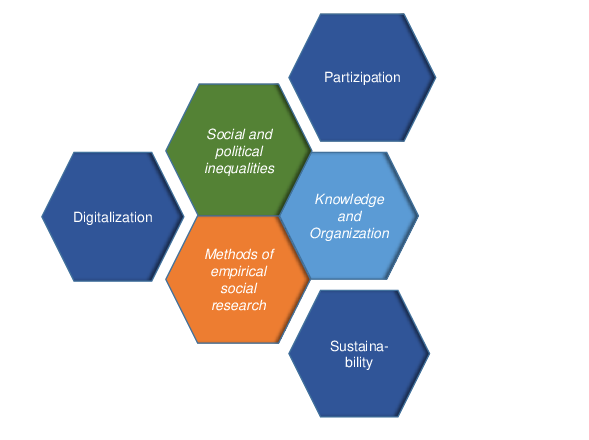Profile of the institute
Profile-building theme: Social cohesion
Cultural, economic, social and political conditions of society and questions of social inequality are at the heart of social science research. In order to understand the current challenges faced in our world, social scientists at Oldenburg rely on both the separate expertise and connections between the two disciplines of sociology and political science. While political science focuses on the study of political action and decision-making processes (often at the level of the government or state), sociology more broadly analyses the relationship between social life, social change, and the social causes and consequences of human behaviour. In bringing together political science and sociological perspectives, the Institute of Social Sciences in Oldenburg is uniquely positioned to explore and understand the order of modern societies and how they respond to threats of the erosion of social cohesion.
Themes: Interdisciplinary and wide-ranging
Thematically, the topics of the institute can be divided into two areas:
(1) Knowledge and organization
To section "Knowledge and organization"
In this topic, we investigate social orders and patterns of social interaction in a changing society. For example, processes such as digitization or sustainable development have far-reaching implications at a range of different levels from families, to organisations such as education and employment systems, and for society as a whole.
(2) Social and political inequalities
To section "Social and political inequalities"
Here, the focus is on the distribution of resources, opportunities and risks throughout society. In particular, we consider how access to social goods and social positions is often bound up in unequal power relationships and social constructions, which are often further exacerbated by particular criteria such as economic status, identity and/or societal practices such as increased digitalisation or sustainable activities.
Through these research priorities, the Institute of Social Sciences contributes directly to the key research themes of the University. Based on a variety of contributions to social cohesion, which are at the forefront of its research, our institute can be assigned to the University's "Participation" research focus. In particular, this ties to our work on social and political inequalities. Our research also reflects the university’s "Sustainability" focus through our attention to knowledge, organization and social change. "Digitalization" is now a key University priority and is also of increasing importance for the Institute of Social Sciences. Contributions to this can be found in most research areas, some of which are also represented by our collaborations with the Computer Science Affiliated Institute of the University of Oldenburg, OFFIS.
Our diverse subject areas are interrogated via a range of research methods. These not only shape the research activities, but also the range of courses offered by the Institute of Social Sciences, particularly in the specialisation areas of our Bachelor's and Master's degree programme as well as the teacher training courses.
Methodological: Quantitative, qualitative and mixed methods
Research at the Institute of Social Sciences is based on a theory-method foundation that combines a variety of theoretical-conceptual approaches with a solid empirical basis. The aim of empirical research is to question and substantiate theoretical findings through empirical analyses and ultimately to derive new theoretical findings. Whilst some of our research focusses upon each distinct epistemological approach, the coupling of methods and theories demanded by theory-driven empirical research means that we often conduct research that integrates both quantitative and qualitative approaches and procedures via ‘mixed methodologies’.




